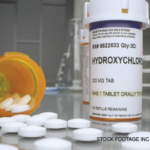
ShutterDivision / shutterstock.com
CHICAGO—As good an option as hydroxychloroquine (HCQ) is for many patients with rheumatic diseases, such as rheumatoid arthritis and especially lupus, safety must be an important consideration, an expert said at this April’s ACR State-of-the-Art Clinical Symposium.
The use of the antimalarial has become a controversial subject, with clinicians trying to balance the drug’s disease-modifying effects with concerns about toxicity to the retina that can impair vision in patients on high and long-term doses. Some rheumatologists worry recommendations issued in 2016 by the American Academy of Ophthalmology (AAO) call for too much caution, possibly at the expense of treatment efficacy.
James Rosenbaum, MD, wears both hats: He’s chair of arthritis and rheumatic diseases at Oregon Health & Science University, and chief of ophthalmology at Legacy Devers Eye Institute in Portland, Ore. In his talk, he said the safety concerns are not meant to curb use of HCQ. He held out acetaminophen as an example: It’s a great drug, but it’s also the top cause of liver toxicity in the U.S., so its use shouldn’t go unchecked.
“It’s a wonderful, wonderful drug—I just want you to use it more safely,” he said, referring to HCQ. “The antimalarial is unique in that it is one of our very few medications that can affect the immune response without impairing the immune response.”
The Research Says
Research has found that patients with stable lupus who stopped their HCQ were more likely to flare over the next six months and to require corticosteroids, Dr. Rosenbaum said. More recently, researchers have also found HCQ could add effectiveness to the primary prevention of cardiovascular events in lupus patients, he noted.1
The 2016 recommendation update by the AAO on HCQ use was based on findings published in 2014 that found the risk of toxicity increased with dosage and duration, and identified other risk factors for toxicity.2
Risk Calls for Monitoring
“If you are taking a higher dose for longer than 20 years, that toxicity is exceeding 50%,” Dr. Rosenbaum said.
The AAO recommendations lists as “major risk factors” a daily dose of more than 5 mg/kg, more than five years of use if a patient has no other risk factors, renal disease and tamoxifen use. Although it’s not known for sure whether diabetic retinopathy or macular degeneration increase the risk of toxicity, the guideline warns they could complicate toxicity monitoring.
The recommendation calls for screening shortly after starting the drug. No more screening is recommended for the next five years. After that, yearly screening is recommended. The most important screening tests, he said, are the automated visual field test and the spectral domain optical coherence test.



